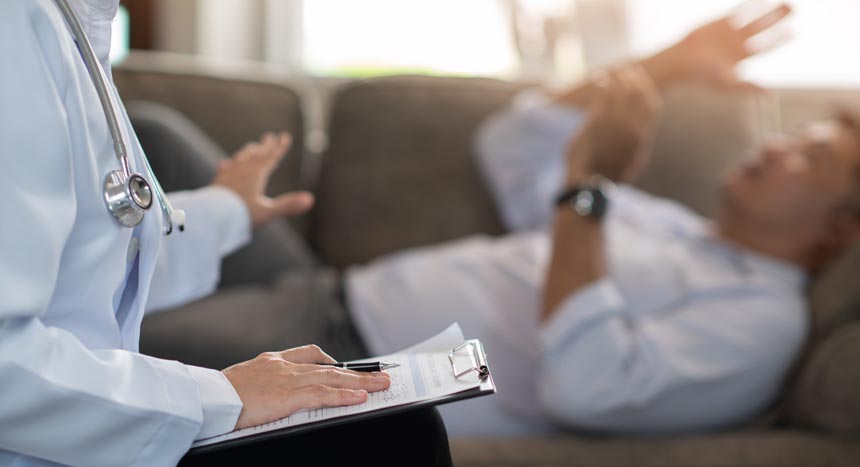Long-term drug abuse carries its fair share of negative effects. The physical conditions that manifest as a result of drug addiction include a variety of hazardous conditions that often carry permanent consequences without even considering the possibility of psychosis from drugs.
Unfortunately, the physical aspect can sometimes be only a minor portion of the byproducts associated with addiction. The mental repercussions can often be just as severe, if not more so, than the physical ones.
Depending on the user’s drug of choice, the mental side effects have a wide range of different conditions. One of the most common conditions, regardless of the substance in question, is psychosis.
Psychosis from drugs is common as a short-term, acute side-effect of over-intoxication, but this isn’t always the case. In particularly severe cases, psychosis may persist, becoming a chronic issue that requires long-term treatment.
Many driving factors exist for addicts developing psychosis from drugs, as each case varies depending on the user. In this article, we’ll examine what causes psychosis from drugs, as well as the symptoms and recovery options.
What Causes Psychosis from Drugs?
There isn’t one specific reason or event that leads to drug psychosis. Instead, a number of factors lend to the development of this condition, including the type of drug, the amount consumed, underlying conditions, and the events surrounding the episode.
Drug psychosis is defined simply as a mental episode or breakdown involved with drug use. All narcotics interfere with chemicals and neurons in the brain. The brain’s internal structure is altered during the course of drug addiction.
Extended periods of the abuse of drugs like cocaine, methamphetamine, cannabis, LSD, and PCP can all trigger psychosis. Withdrawals associated with these drugs may also trigger a psychotic episode. These episodes have the potential to be short and long-term, depending on the situations surrounding the psychosis.
Users that experience drug-induced psychosis are at risk for developing the symptoms in the future. When mental illness is present in an addict, they may use drugs as a way to cope with their underlying condition.
This can lead to long-term psychosis and present a different set of challenges moving forward. Developing psychosis may make it difficult to discern between this condition and other long-term illnesses such as bipolar disorder and schizophrenia.
One of the most important steps to assisting individuals who have drug-induced psychosis is first to understand the symptoms. The following section outlines behavior and signs addicts display during drug-induced psychosis.
Symptoms of Drug-Induced Psychosis
There is a wide range of symptoms related to drug-induced psychosis. However, users suffering from one of these episodes may display the following symptoms:
- Extreme paranoia
- Delusions
- Hallucinations (auditory and visual)
- Symptoms of anti-social behavior
- Panic attacks
- Confusion
- The belief someone is spying on them
- The belief a spouse is cheating on them
The hallucinations often include seeing individuals in the shadows in peripheral vision. Auditory hallucinations may include the false belief that someone is talking about them or arguing.
It’s important to understand the difference between drug-induced psychosis and a psychotic episode. Actually, drug-induced psychosis is a form of a psychotic episode. Multiple forms of psychotic episodes exist among individuals that suffer from these ailments.
Features of a Psychotic Episode and Different Forms
A psychotic episode is what leads to a psychotic disorder. Disorders that fall into this category include:
- Schizoaffective disorder
- Schizophrenia
- Delusional disorder
- Brief psychotic disorder (drug-induced psychosis included)
Features of a psychotic episode tend to vary across all different types but have similar properties. However, early warning signs can indicate an oncoming psychotic episode. Individuals may exhibit the following symptoms before suffering from a psychotic episode:
- A marked decrease in grades or job performance
- Difficulty concentrating on tasks
- Becoming more isolated from family and friends
- Noticeable decline in hygiene and self-care
- Either strong emotions or a lack of emotions
- Becoming suspicious or distrusting friends
- Unusual thoughts that are contradictory to reality
Recognizing psychosis from drugs is important to help individuals when these conditions manifest.
Recognizing Psychosis from Drugs
Recognizing psychosis from drugs is vital to assist suffering individuals. The symptoms listed previously in the article are important to look out for, and there may also be accompanying physical markers. These physical indicators may include the following:
- Intense sweating
- Large pupils
- Pacing
- Heavy breathing
- Rapid heart rate
- High blood pressure
Many times, individuals close to the user may be aware of the presence of the addiction. This can be important in identifying the development of drug-induced psychosis. The following section highlights drugs that can cause psychosis.
Drugs That Can Cause Psychosis
Multiple substances lead to the development of drug-induced psychosis. Many times mixing multiple substances can further complicate this issue. Drugs that can cause psychosis may include the following:
- LSD
- PCP
- Cocaine
- Methamphetamine
- Marijuana
Marijuana has a unique relationship with schizophrenia specifically. Many physicians believe there is a distinct link between these two.
Cannabis and Schizophrenia Link
THC contains psychoactive properties, and many users experience certain symptoms like paranoia, anxiety, and hallucination. Individuals predisposed to the development of psychotic episodes may be at higher risk for developing long-term disorders.
Many studies show the possibility that the consumption of marijuana in younger people poses a higher risk for the development of schizophrenia. This is especially true when the individual’s family has a history of these types of conditions.
In studies, younger people that developed schizophrenia and other psychotic disorders reported marijuana use two-thirds of the time. Many times, the age of marijuana use directly correlates with the age of the development of schizophrenia.
Regardless of age, mental illness and psychosis always seem to be directly linked. A large majority of individuals that suffer from different forms of mental illness initially suffer from bouts of psychosis. Many times this comes in the form of drug-induced psychosis specifically.
Providing treatment for these conditions is vital, and simultaneously identifying the conditions and treatment of drug addiction is necessary. Users must have access to dual diagnosis treatment options to treat both conditions effectively.
Dual Diagnosis Treatment Options

The presence of mental health awareness becomes important in treating mental conditions and drug addiction simultaneously. This seems to be the most effective remedy in the battle against drug-induced psychosis.
Dual diagnosis is the identification and subsequent treatment of drug addiction accompanied by an underlying mental health condition. Specific remedies exist for dual diagnosis treatment options.
Around the clock, intensive inpatient rehabilitation facilities are the best option for individuals with substance abuse disorder. However, outpatient options exist in certain situations for individuals that must maintain a job and family dynamic.
Steps are taken to alleviate symptoms like mood swings, paranoia, and hallucinations. These steps may include prescription medication options and rigorous one-on-one counseling sessions as well as group meetings for addiction.
Steps to Take for Acute Psychotic Episodes
Besides participating in therapy for relief, there are several exercises that exist that promote a calming atmosphere amid psychosis. Use the following list as a guideline to assist individuals in the middle of an episode.
- Make sure the environment is quiet and free of any loud noises and distractions. There should be no sudden movements or anything to trigger more stress. If possible, put the individual in a familiar, comfortable place. It may also help to dim the lighting to promote a more calming ambiance.
- Encourage the individual to use breathing exercises. Many times taking deep, slow breaths may often combat the symptoms, including rapid heart rate and hyperventilation. If needed, participate in breathing exercises with the individual, counting as you take the breaths.
- Reassure the individual that they are safe and nothing can harm them. Sometimes reminding them of a positive or enjoyable memory can help, but it’s important not to lead them into thoughts that may trigger negative feelings. This can make the situation worse.
- When the situation is difficult enough, contacting emergency medical professionals is necessary. It’s important to do your best to keep the patient calm while you wait for medical help to arrive.
Despite the frightening situations that manifest during drug-induced psychosis and other psychotic episodes, long-term recovery is possible. However, it’s important to follow the correct protocol in order to assist individuals with obtaining the most efficient form of help.
Make sure the person has a strong support system. This is critical after treatment for keeping them positive and abstinent from drugs.
Lasting Recovery is Possible after Psychosis From Drugs
Even after individuals recover, one relapse can potentially trigger an unfortunate series of events that resets the entire process. This is why sobriety and continued treatment options are vital even after therapy or rehabilitation.
Individuals should be encouraged to attend group meetings and continued counseling sessions to maintain the underlying mental condition. Prescription medication often provides significant relief, but this should never be considered a permanent solution.
The patient must learn other methods of dealing with psychotic disorders throughout the duration of therapy. This is vital in preventing relapse and continuing successful recovery.
Through a strong support system and strong attention to mental health, long-term recovery is possible. Even the worst cases can experience relief when all of these elements are in place.
Individuals in need of treatment options are encouraged to contact Circle of Hope Treatment Center. We’ve helped clients through the most difficult parts of substance abuse, including recovering from psychosis associated with addiction. Even the most challenging cases have the potential to become success stories. Don’t hesitate to reach out to speak with anyone from our Admissions Department to get the information needed to begin the journey to recovery.

